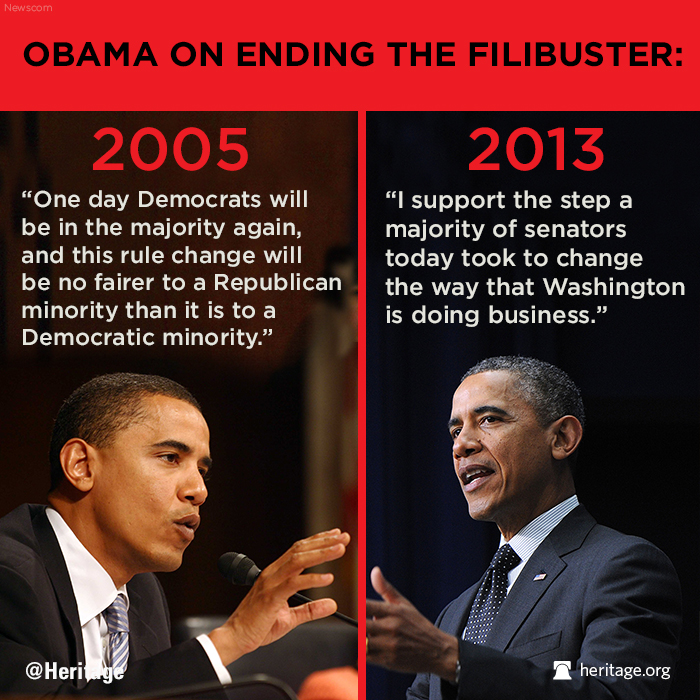As President Obama said, they got away with it.
Harry Reid and the Democrat-controlled Senate got away with changing the Senate’s rules so that they can shove through anything they want without having to worry about Republicans filibustering against it.
Just a few short years ago, then-Senator Obama spoke forcefully against doing what Senate Majority Leader Reid (D-NV) just did. When Republicans talked about a similar rule change in 2005, Obama said (emphasis added):
Obama’s 180-degree turn on this issue—based on who’s in the Senate majority—is perhaps most amusing when you see that he invoked the American Founders in defense of both positions.
In 2005, getting rid of the filibuster “certainly is not what the patriots who founded this democracy had in mind.”
But today, using the filibuster is “not what our Founders envisioned.”

Now, whatever the Democratic majority in the Senate wants, it can be done. The rule change means that instead of needing 60 votes to cut off debate on a nomination, Reid needs only 51. He has 55 Democratic Senators.
As Heritage legal analyst Elizabeth Slattery noted, “Though the rule purportedly applies only to executive branch and judicial nominations—excluding Supreme Court nominations (for now, anyway)—it would seem with 51 votes, Reid can do just about anything.”
The change could be undone again with another simple majority vote. But the minority may just want to wait it out until they get their turn—Senator Chuck Grassley (R–IA) has said, “Go ahead. There are a lot more
[Antonin] Scalias and [Clarence] Thomases out there we’d love to put on the bench.”
Read the Morning Bell and more en español every day at Heritage Libertad.
Quick Hits:
Harry Reid and the Democrat-controlled Senate got away with changing the Senate’s rules so that they can shove through anything they want without having to worry about Republicans filibustering against it.
Just a few short years ago, then-Senator Obama spoke forcefully against doing what Senate Majority Leader Reid (D-NV) just did. When Republicans talked about a similar rule change in 2005, Obama said (emphasis added):
I urge my Republican colleagues not to go through with changing these rules. In the long run, it is not a good result for either party. One day Democrats will be in the majority again, and this rule change will be no fairer to a Republican minority than it is to a Democratic minority. I sense that talk of the nuclear option is more about power than about fairness. I believe some of my colleagues propose this rule change because they can get away with it rather than because they know it is good for our democracy.Yesterday, the President’s strong words in support of the filibuster were but a memory, as he declared his about-face in favor of the Democratic majority seizing power. “I support the step a majority of Senators today took to change the way that Washington is doing business,” he said, describing Reid’s power grab in lofty, for-the-people terms.
Obama’s 180-degree turn on this issue—based on who’s in the Senate majority—is perhaps most amusing when you see that he invoked the American Founders in defense of both positions.
In 2005, getting rid of the filibuster “certainly is not what the patriots who founded this democracy had in mind.”
But today, using the filibuster is “not what our Founders envisioned.”

Now, whatever the Democratic majority in the Senate wants, it can be done. The rule change means that instead of needing 60 votes to cut off debate on a nomination, Reid needs only 51. He has 55 Democratic Senators.
As Heritage legal analyst Elizabeth Slattery noted, “Though the rule purportedly applies only to executive branch and judicial nominations—excluding Supreme Court nominations (for now, anyway)—it would seem with 51 votes, Reid can do just about anything.”
The change could be undone again with another simple majority vote. But the minority may just want to wait it out until they get their turn—Senator Chuck Grassley (R–IA) has said, “Go ahead. There are a lot more
[Antonin] Scalias and [Clarence] Thomases out there we’d love to put on the bench.”
Read the Morning Bell and more en español every day at Heritage Libertad.
Quick Hits:
- What can conservatives learn from Pope Francis?
- Economic and religious liberty are interrelated. Here’s why.
- Share this with friends: Arguments in favor of the United Nations Disabilities Treaty rely on wishful thinking and manipulative arguments.
- Evangelicals recently examined the question: Does Scripture teach faithful Christians to support amnesty?
- The White House’s Council of Economic Advisors claims Obamacare has slowed health care costs. But has it REALLY?
- Good to know: Wisconsin’s Governor Scott Walker (R) is a fan of Heritage’s alternative ideas for health care reform.

No comments:
Post a Comment